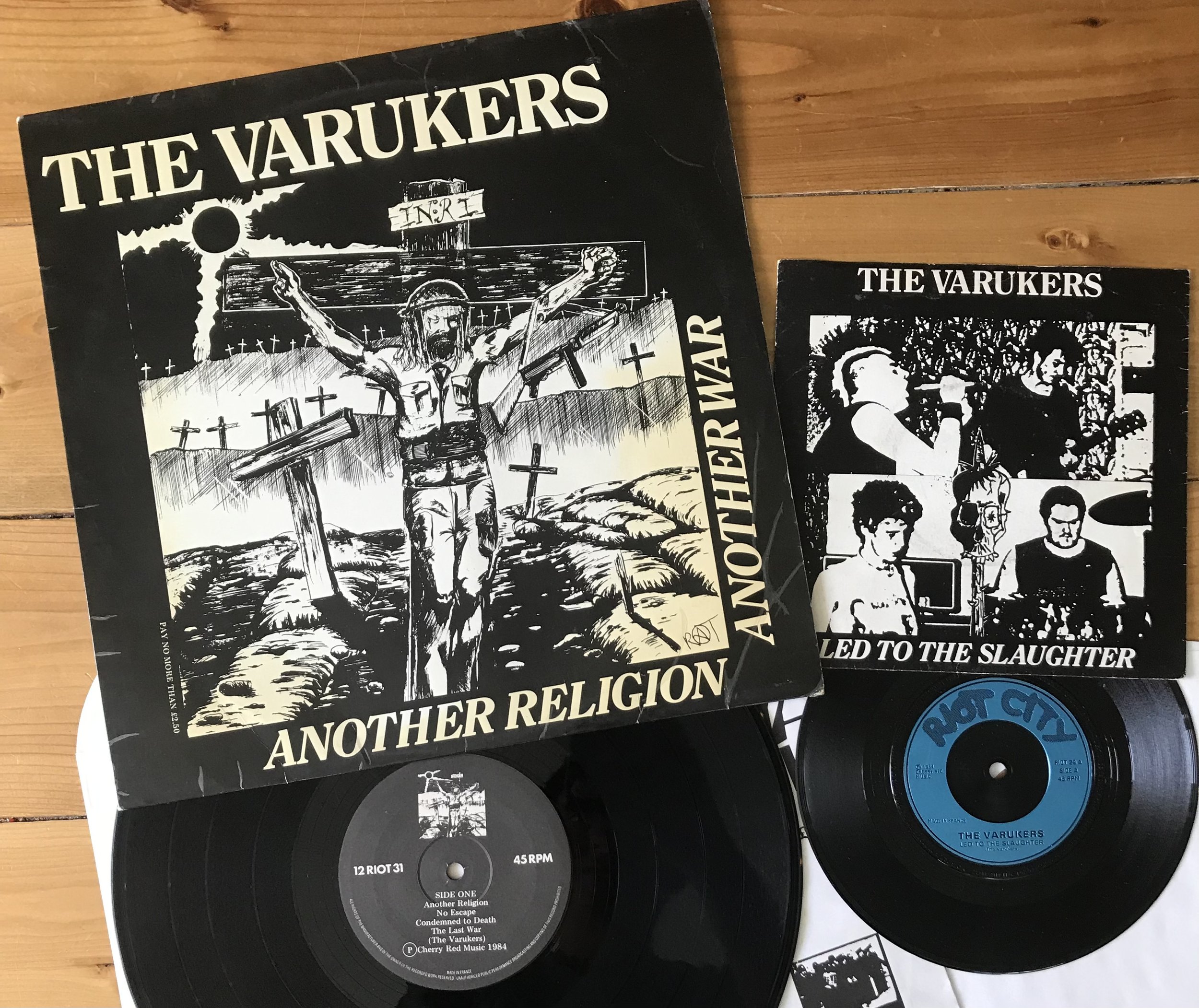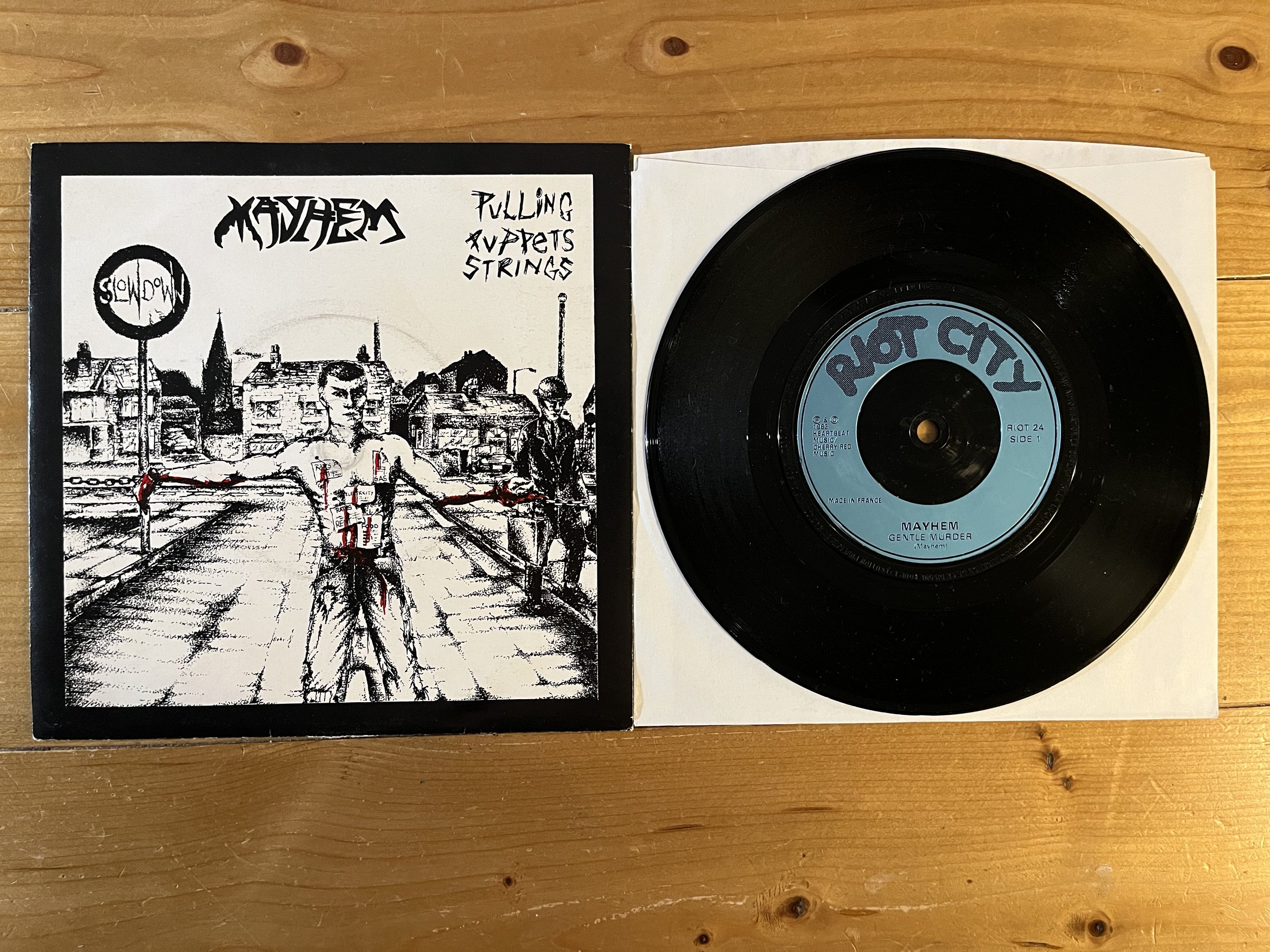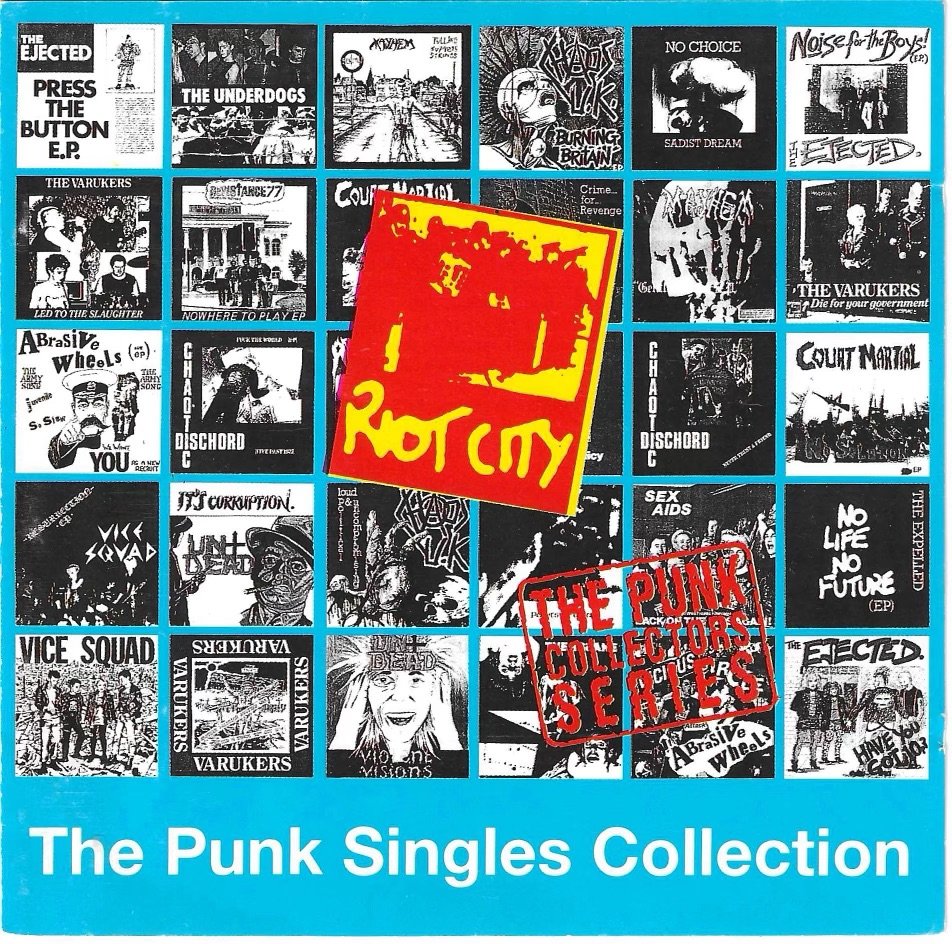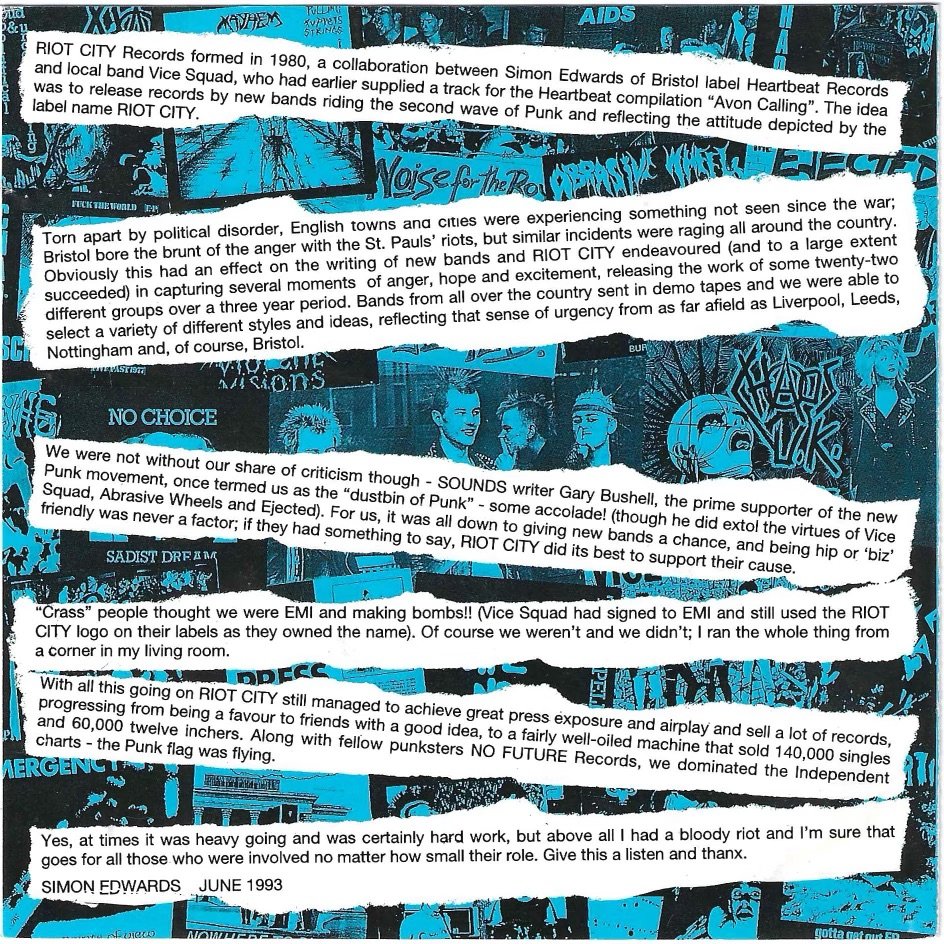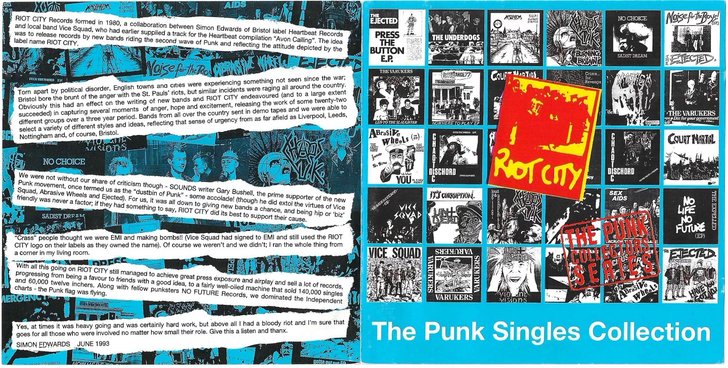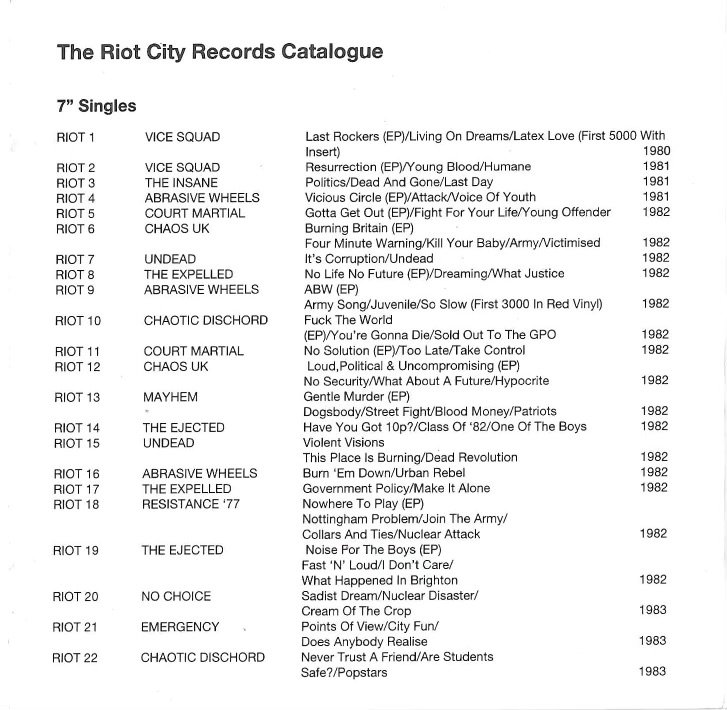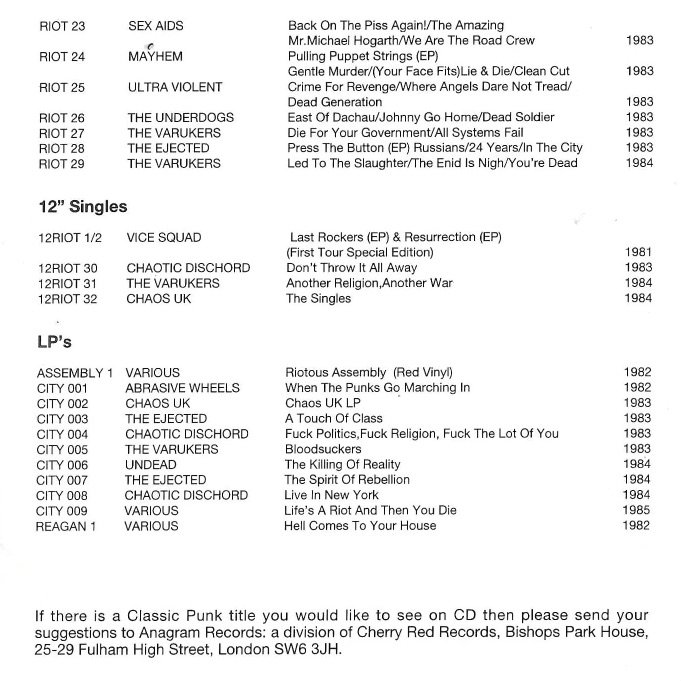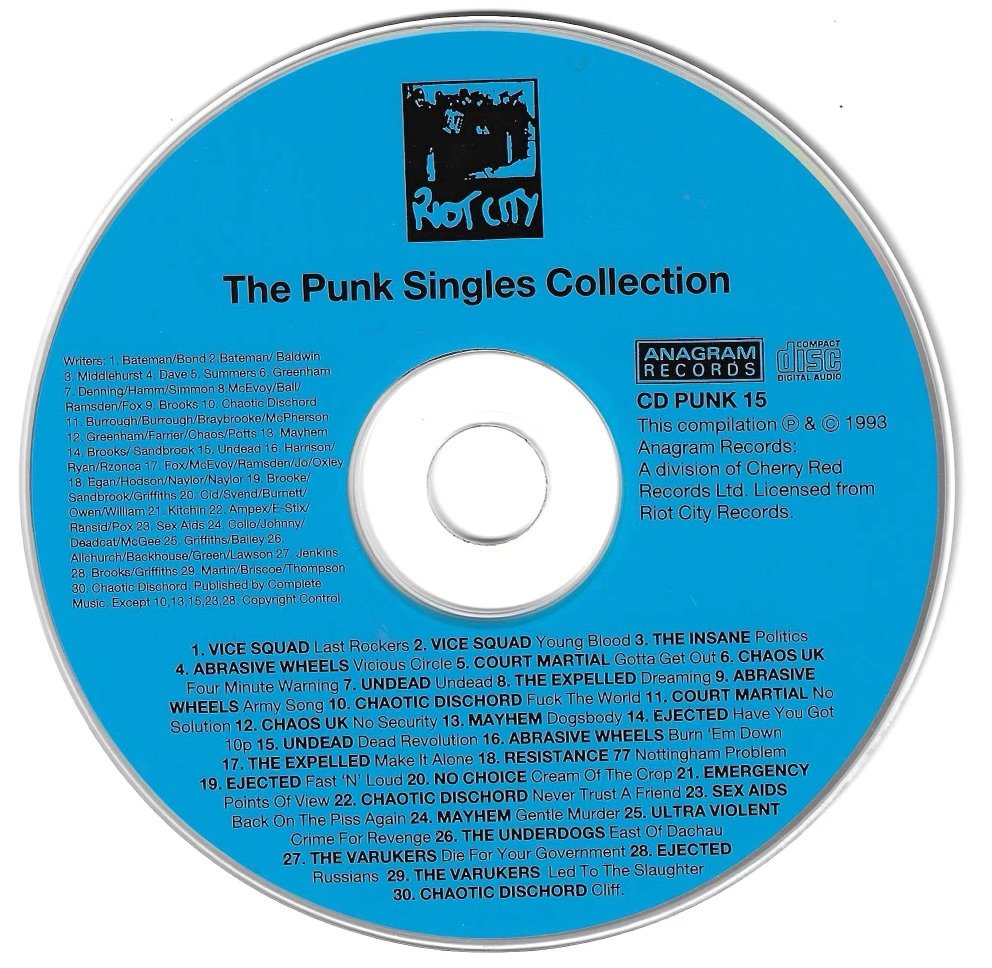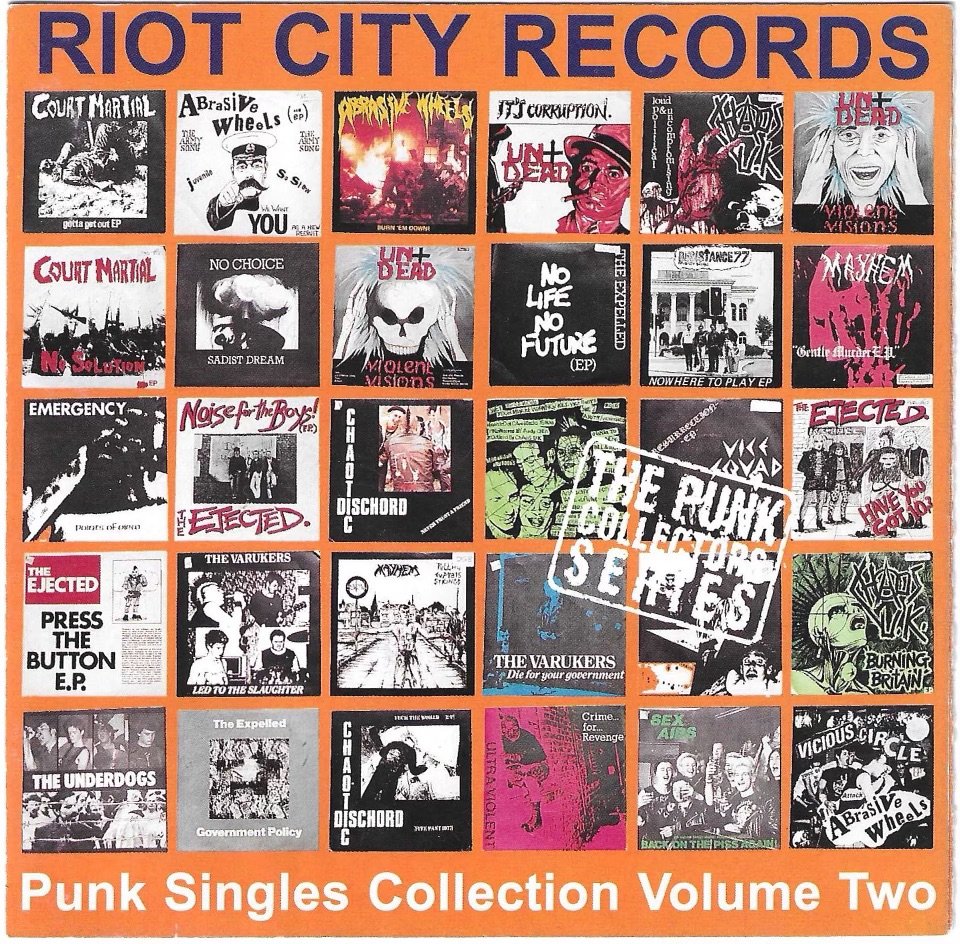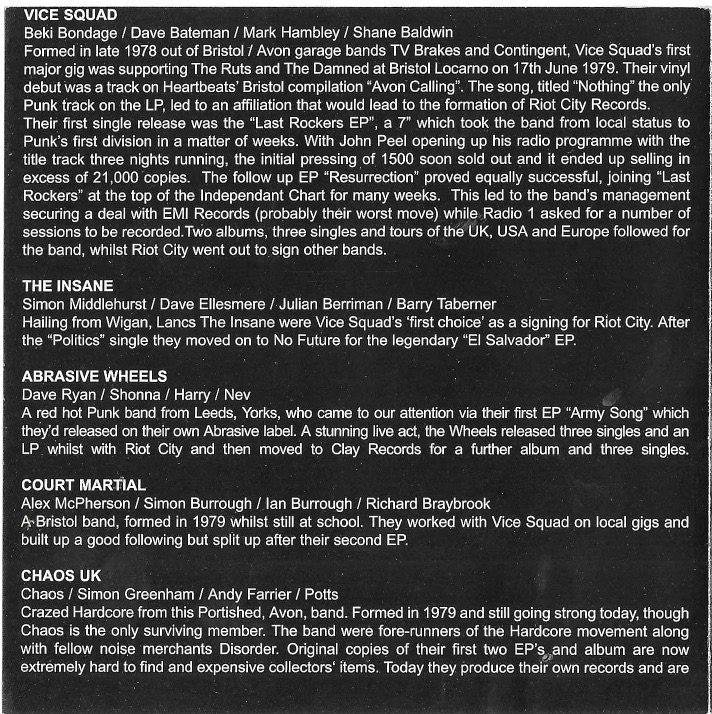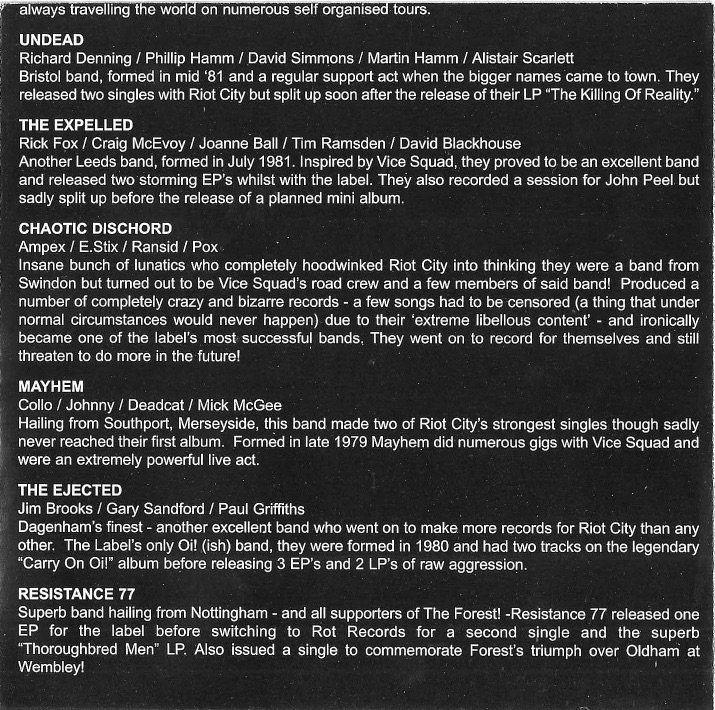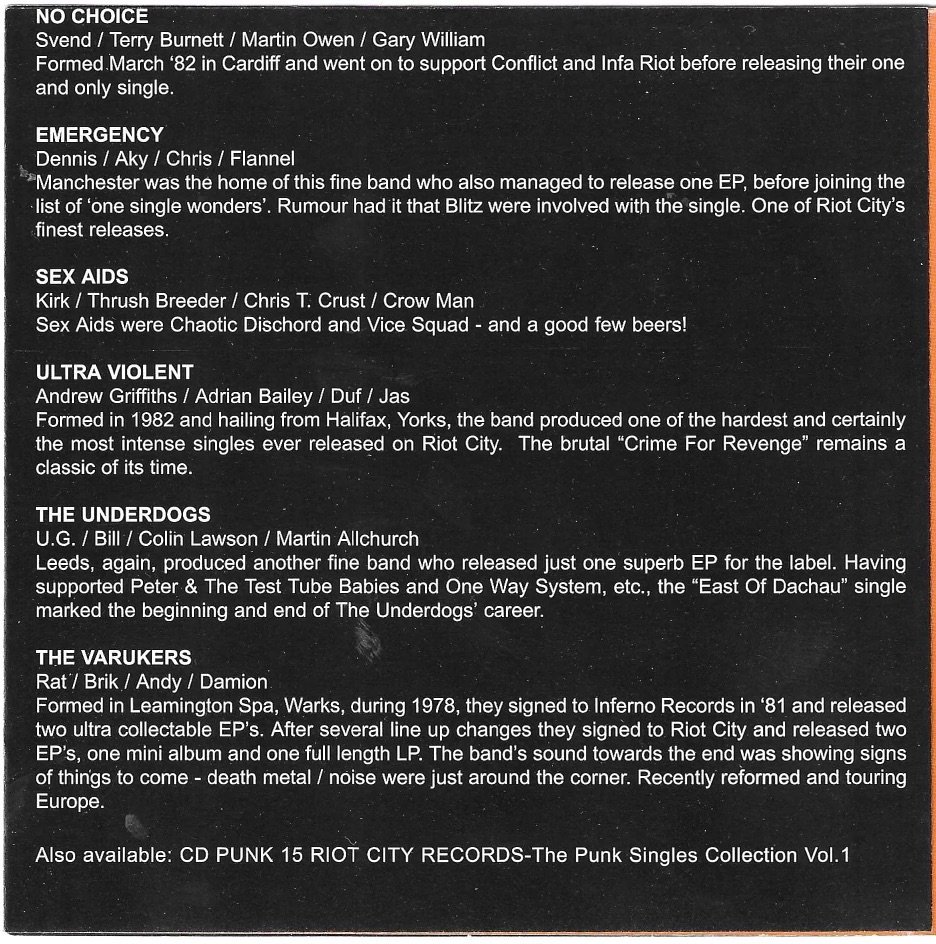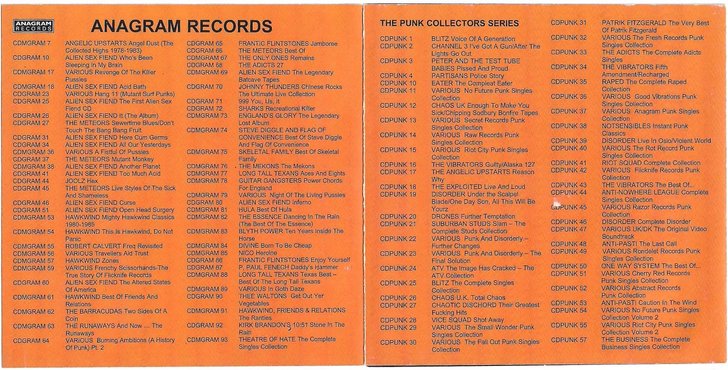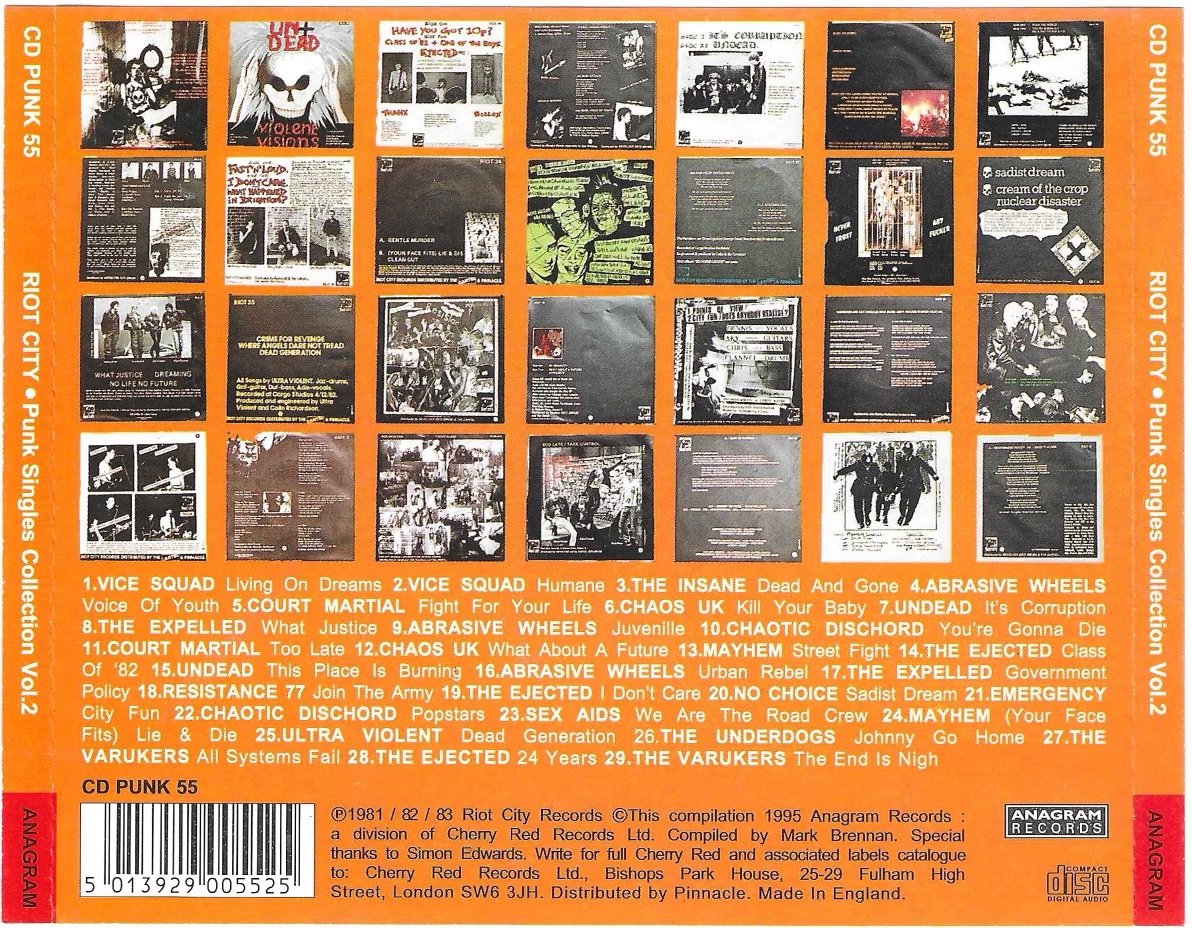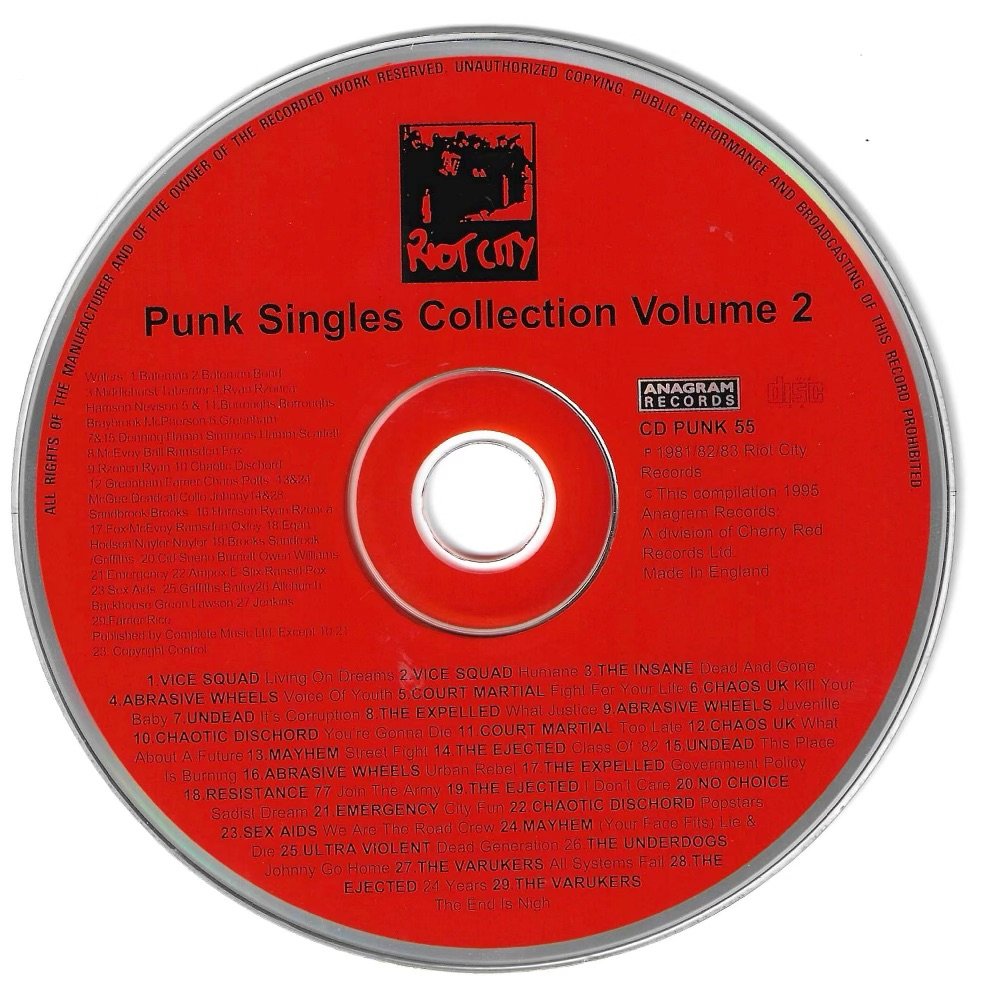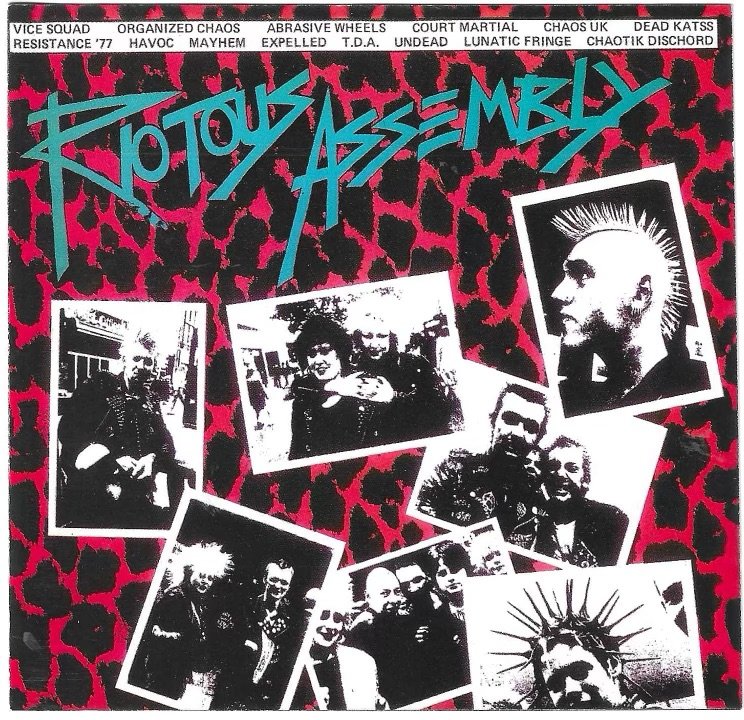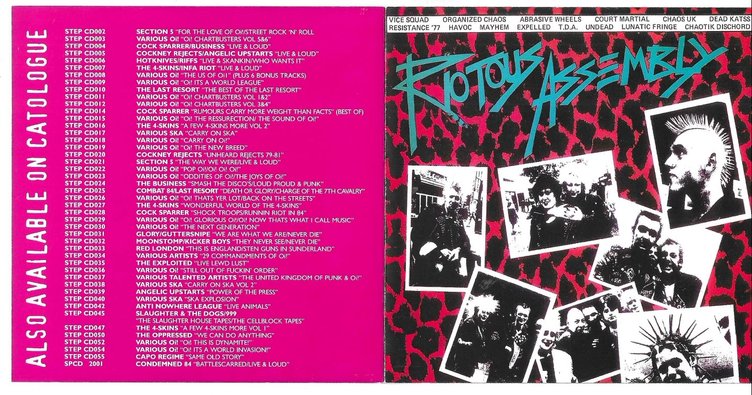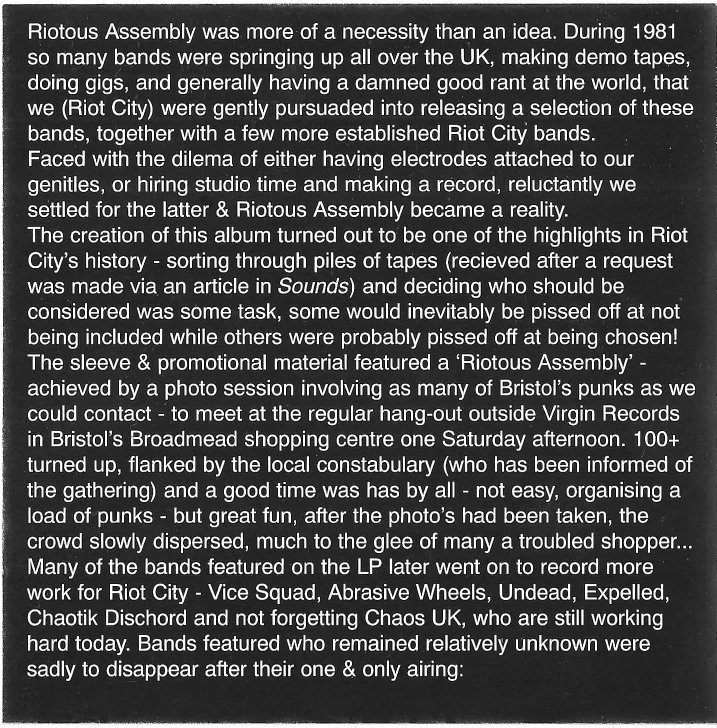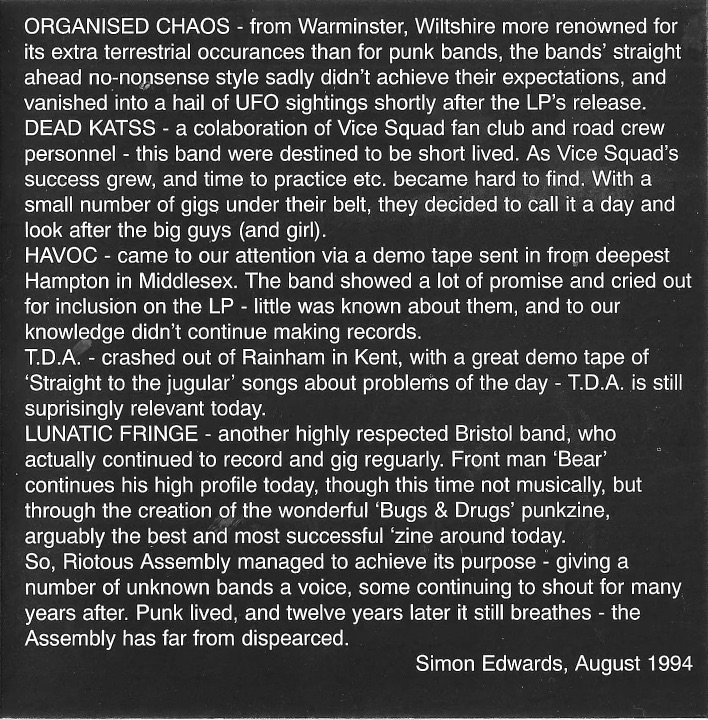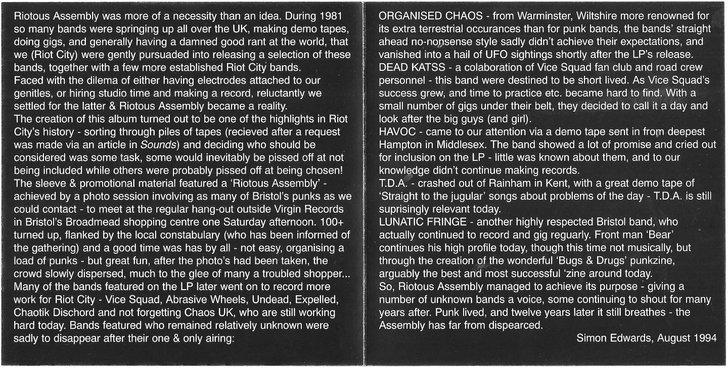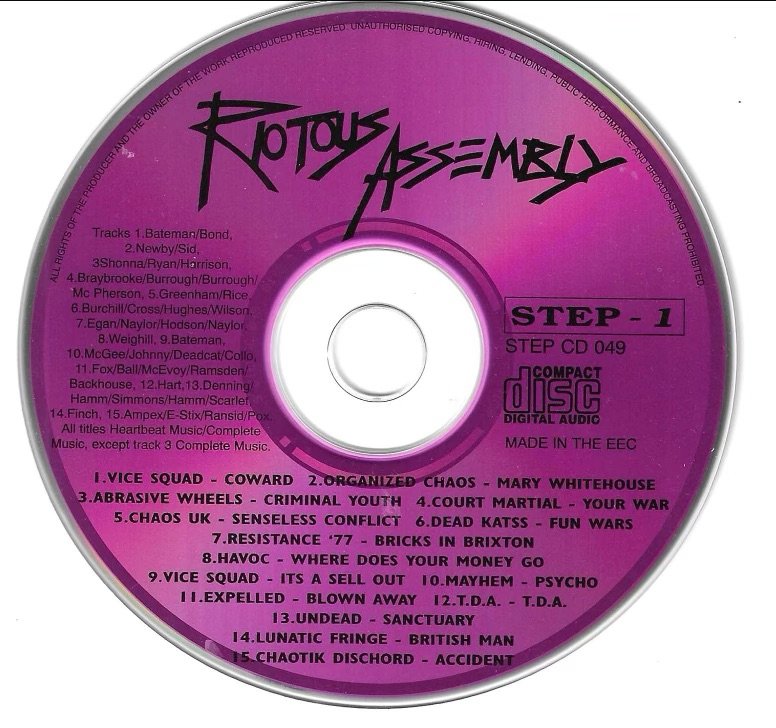Riotous Assembly: The Story of Riot City Records, the Noisiest Label in UK82
Riot City Records had it all: an iconic name, a brilliant logo and image, and the most hardcore roster in the entire UK82 genre.
Taking its name from the civil unrest that had earned Bristol the nickname as the "riot city" in 1980, Riot City Records was born in the same year as a joint venture between Heartbeat Records owner Simon Edwards and members of the band Vice Squad.
Initially formed as a vehicle to release records for Vice Squad, the label quickly branched out to releasing singles from other groups such as The Insane, Abrasive Wheels, Court Martial, and Chaos U.K. as well as 1982's "Riotous Assembly" compilation album. These releases helped to establish the label, and in short order, Riot City were known for putting out premier pounders.
After a disagreement over the direction of the label due to Simon Edwards' desire to embrace the more hardcore sound that was gaining popularity, Vice Squad left the label solely to Simon (although they continued to use the logo on various Vice Squad releases, leading to considerable confusion over if the label had been acquired by EMI and was a front for the majors). With this, the label became known for having the most cutting edge sound and style in the U.K. punk scene. Together with counterpart No Future Records, Riot City dominated the independent charts and was at the forefront of underground punk throughout the early '80s.
In addition to Riot City, Simon Edwards also headed up the offshoot labels Disorder Records (for releases by Disorder, who were "too hardcore" for Riot City) and Not Very Nice Records (for later Chaotic Dischord releases).
In this interview with Negative Insight, Simon Edwards discusses the entire label history in amazing detail, as he looks back on the era with a candid and palpable fondness.
Note to readers: The bulk of this interview was originally conducted on July 4, 2008. However, more info was subsequently added to it in the following years through further correspondence with Simon Edwards.
How and when did you get involved with working for record labels? Were you the owner of Heartbeat Records?
Yes to the question, I was the owner of Heartbeat Records. Basically my background was I used to play in bands. I then started managing bands and just looking after them and recording them. And then when the independent label thing started in 1976-77, I thought that I could do that as well. So I started Heartbeat Records. I just basically asked a lot of silly questions, "How'd you do this? How'd you do that?" And then I did it, and it worked. And I just went on from there.
How did you first hook up with Vice Squad? I know they were first on the "Avon Calling" compilation on Heartbeat.
That's right. Well, when I was doing Heartbeat Records, Heartbeat Records was essentially just for sort of local bands around the Bristol area. And there were so many bands around at the time that I couldn't put out enough records to satisfy the demand and all the stuff that was going on. So I did "Avon Calling" because that was the obvious thing to do to to try and get a lot of the bands on a record so they could get onto the radio and get people to hear it. And Vice Squad were one of the bands that gave me a demo tape. They were also playing around the area as well, and I was quite impressed with them. So, yeah, they got a place on the album.
How did Riot City come to be formed, and why not just release the Vice Squad EP on Heartbeat Records?
Because Heartbeat was a label that was essentially for a broad spectrum of music. If you've heard all the Heartbeat releases, a lot of them are quite different than the others. There's some quite sort of folky things, and there's some quite hard rocky things, and there's some punky things. So it tended to sort of encompass a pretty broad spectrum of music. But with the Vice Squad thing, after "Avon Calling" was released, Vice Squad brought me a demo with four tracks that they wanted to put on an EP. And at the time with Heartbeat Records, I had a label link like a licensing deal with Cherry Red Records up in London and they did a lot of my distribution. I used to take all the stuff up, and I used to play demo tapes to the guy at Cherry Red, Iain McNay. Well, I took the Vice Squad tape up there, and i said "Look, hey, we've got this new band that's come along. They're on 'Avon Calling,' and now they've done their own EP and it sounds great." You know, and I played it to him and he said it was horrible. (Laughter) He didn't like it at all. And he said "Well, I don't really want Cherry Red Records to be involved in that at all, even on a distribution basis." So I said "OK, OK." So in the back of my head I thought "Well fuck you, I should do it myself," which is what I did. I made 1500 copies of it for the first pressing and never looked back shall we say. Before we did it though, Vice Squad did decide that they would also like to form a label that they would manage because there was a lot of new punk bands starting up with the second wave of punk. And they wanted to put a lot of these bands out on this record label. They wanted to call it Riot City Records because at the time, in this city of ours, Bristol, there were a lot of race riots in the poorer areas of Bristol. And of course a lot of the kids in Bristol were a bit sort of frightened and a bit worried of what was going on. So we really considered Bristol to be a "riot city." It just seemed the right thing to call the label Riot City Records, which is what we did. But obviously because Vice Squad, after they released their first EP, it sold so well and it got to number 1 in the Independent Charts and they started doing tours and they really became too busy to worry about doing the label. So they basically left it up to me to manage the label.
With the first press of "Last Rockers" only being 1,500, could you have imagined it going on to do so well with 22,000 copies sold and 40 weeks total on the chart?
Well, no because when we did the Heartbeat Records releases, we were sort of selling 2,000, 3,000 copies of each single, which to me was great. It was a really good thing to get those sort of sales. When the Vice Squad single sold, the "Last Rockers" sold 1,500 copies in about three or four days, and I just couldn't believe that. I thought "Why, what's going on here?" And so I then pressed up another 1,500 copies 'cause I thought that might, you know, just about fulfill the sales expectation. But then that, again, sold in about three or four days, and I thought "Shit, I'm going to have to rethink this thing." So I then pressed 10,000 copies and just away it went. It was just crazy, and I never ever expected it would go like that. But at that time, the second wave of punk was really taking off and there were bands like Chron Gen and the Exploited and everything just took off and went crazy.
With all the success for Vice Squad, what were your feelings when they signed on with EMI's Zonophone label and why? Did their signing with EMI gain greater exposure for Riot City or hurt the label?
Well, I didn't actually agree with them signing to EMI. I didn't think it would do them any good at all because I thought "Well, surely if there's enough demand for Vice Squad material, we can meet that demand through Riot City independently." And I still believe we could've done. And I actually know that I sold more Vice Squad records than EMI did, but that's another story. (Laughter) They had a management team, well, not team, but they had a couple of guys working for them who were really sort of set on them signing to EMI. And there was not a lot I could do about it. I was the guy that was publishing their music. So I did think in a way "Well, so long as I can keep the publishing, if they want to go and record for EMI, that doesn't really matter because then at least my Riot City publishing side of it will benefit from their EMI sales. And then I can still put out new singles by other bands." So that's the way I thought about it. But, no, I wasn't happy about them doing it. I think it probably got them out to a different type of audience because a lot of independent record shops that were selling punk rock at the time didn't want to stock EMI records. Even though the Sex Pistols were on EMI, the Sex Pistols were probably like a... I mean they were a bit of a one off in as much as yes, they signed to a major, but the second wave of punk really was a bit more independently minded. I think they would have sold a lot more had they stayed with me, really, for that reason.
Would you say this caused some confusion and resentment, when they did sign, from the more "hardcore" punks concerning the label?
Yes. Yes, it did because Dave and Shane from Vice Squad were the people that came up with the name Riot City. They were partially intending on using that for their EMI releases. Now I was happy with that because, I didn't mind, because I just wanted the name Riot City to be out there. So I was using it on my releases, they were using it on theirs. Now, we did get a bit of flack from the hardcore element, like I told you before. Particularly the Crass people were not happy with it, and they thought I was the back door to EMI. And they obviously didn't like EMI because of their corporate leanings, shall we say. I didn't have any connection whatsoever with EMI. The only connection I had with EMI was that they were paying me money for the publishing of Vice Squad music.
Would you say that you staunchly felt that punk should be independent and exist outside of the mainstream music industry? Did you identify with the DIY ethos of hardcore punk?
I do identify with the DIY and independent aspect of it, but I don't think that any genre of music has the right to stay in one place. If corporates want to do it, so long as they do it well and they do it right, I'm quite happy for them to do it. Basically it's all about the music isn't it really at the end of the day? If you can put out good music then I will back you as a record buyer no matter what label it's on.
I know you had a full time day job back then, but did you ever consider trying to live off the label?
Many times... But I've never been good at taking risks. (Laughter) I'm probably one of the world's worst businessmen. I do all the hard work and all the running around and all the craziness of it, but as far as putting in my hard earned gains like my house and that type of thing against doing that, then the answer would be no. My family would always come first.
How old were you at the time, and, since you weren't coming from the same angle as the new wave of punks, did you have any difficulty in relating at all?
I was in my 30s when I started it off, so I was a lot older than a lot of the guys that were in the bands. When I was younger, I was into the Small Faces and the Rolling Stones and the Who. You know, bands like that. I've always been into what I call the punk rock side of the music. I've always liked the anger, the angst, and I could always relate to kids who've got that feeling and that sort of ethos. So I didn't ever feel like an alien with these guys. I got on really well with them. And I always wanted to try and be a fifth member or sixth member of the band. I wanted to help them get through everything they had to do.
Abrasive Wheels
After the first two Vice Squad EPs, next up was the Insane and Abrasive Wheels singles...
Well, no, it wasn't actually. We did the first two Vice Squad EPs. And we had the third tour by the "Resurrection" EP, and I did a 12" single which was putting the first two 7" EPs, one on either of this 12" single, which was like a tour release. That was the third one.
So did Vice Squad choose the Insane and Abrasive Wheels, and when did you take over complete control of all the label decisions?
When we were on tour, we did a few gigs with the Insane. So the Insane became sort of friends of Vice Squad, and they were obviously a preferred release by Vice Squad, yeah. Abrasive Wheels were obviously known to Vice Squad and they were known to me, but I really wanted to find the band because I'd heard their own release of "Army Song," and I thought it was really, really good. And I thought the band would be good on the label. So that was really my own first release on the label, yeah.
Were you disappointed with the Insane and Abrasive Wheels moving onto No Future and Clay, respectively?
No, no. The way I approach these things is I'm a fan, alright. I buy music as well as make it, and I still do. I was buying loads of records in those days by other bands, so I had more of an affiliation with other labels, and I had a lot of love of what they were doing. So if the bands wanted to go somewhere else, I wasn't going to stand in their way. I wasn't that type of operation. I didn't sign the bands up for three years to make so many singles and albums with me. It was a very relaxed kind of relationship. The Abrasive Wheels more than the Insane, I mean I loved the Wheels, and we got on really well and I thought their music was great. Sure, it'd be nice to keep them, but I didn't really mind when they went, ya know. Probably of all of the bands that did go, they were probably the ones that I was sadder to see leave, but I was still supportive of them.
Well, let's face it, their releases on Riot City are much better than their releases on Clay...
Well, you said that, and I'm going to agree with you. (Laughter)
How were you distributing the records through Rough Trade and the Cartel? Could people also mailorder a copy from you? Did you have any U.S. or international distribution?
We did it through Caroline. Caroline Exports from the UK put all the stuff out from Rough Trade. And also Rough Trade had the Rough Trade America, didn't they, as well. So the Cartel went out through that direction. The Rough Trade and the Cartel was a really good little operation because I believe there were six separate outlets around the country in various cities like Bristol, York, Birmingham, Edinburgh... And they all had their own shops that were acting as little parts of this distribution network. It just meant that I could just go down the road and just take in the records to the shop and say "Here's another thousand of these." You could really see what was happening, and you could see the sales going, you could see all the sales slips coming in and the order forms. It was just quite an exciting time.
When and how did the "Riotous Assembly" compilation idea come about?
Again, that was a bit like, if you go back to what I explained about "Avon Calling," I was getting hundreds and hundreds of demo tapes from bands all over the country. You just feel, well I felt, that I wanted to try and help some of them. Just get a release of one of their songs on a record. "Riotous Assembly" was really an amalgamation of all those demo tapes that I thought deserved a chance to be heard. Some were a good idea, some maybe not so much a good idea. (Laughter) I'd say the album was alright, it was good. A bit of fun.
How did you advertise for submissions for it? How many demo tapes would you say you received from bands interested in being featured?
There was a little piece put in Sounds magazine. I think I spoke to one of the journalists and said "Look, I've got this idea. I'm going to do this compilation album. Bands that want to send me demos can." But before that really happened, I was getting demos anyway, so I already had a small number of bands that I could choose from.
The Undead
I know this was your first encounter with "Chaotik Dischord", but was this also how you first got in contact with bands such as Court Martial, Undead, Expelled, and Chaos UK?
Those were all local bands, and so I live in the same town they live in. You tend to sort of run into them at gigs and pubs and things like that. And they just give you a cassette and say "Here listen to this. What do you think of this?" I see them playing live, and if I'm impressed with them I'd have said "Come on guys, let's do a single."
Were any of the other bands on the compilation ever offered to further record material for Riot City?
I don't think so, no. A lot of those bands were very, very small bands that weren't doing a lot. I just felt that one song that they'd done was really good, and they needed a chance. It wasn't really sort of a stepping stone to a Riot City EP. It was really a stepping stone for them to get off their arses. "Here's an opportunity for you to be heard. Now use it for yourselves and go out there and do something."
Can you please recount the Chaotik Dischord demo submission story and your feelings upon finding out it was members of Vice Squad?
(Laughter) What a jerk! Ya know? Well, let's put it this way: Because of the nature of how I used to receive demo tapes, people would give me demo tapes in pubs, people would send them to me in brown envelopes, and you know, you don't know who these guys are. They could be bloody anybody. But I was at a pub one evening, and the Vice Squad guys were all there. And the Vice Squad guys told me that they had had a tape sent to them by a band from Swindon called Chaotic Dischord. They asked them to give it to me because they didn't want to speak to a guy from a record label. I mean something as silly as that. And I bought into it. I thought "Well, yeah, some people are like that, some people aren't. Some people may be a bit nervous about meeting such an industry mogul as myself." (Laughter) So I thought "Fuck it, yeah. I'd give it a listen." So I played it, and I thought it was really good. After, I had no idea it that it was those guys, no idea at all. But the other thing was, I don't know how, but do you know a band called the Amebix?
Yes, I do, yeah.
Yeah, well, one of the guys from the Amebix told me. He said "Simon, you've been hoodwinked here. I'm sure this is fucking Vice Squad." I thought "Don't be fucking stupid, does that sound like Vice Squad to you?" I think he'd probably heard, you know. (Laughter) He knew, yeah. But I mean fuck it, it was the rock 'n roll swindle, wasn't it? (Laughter)
Were there other Vice Squad side projects besides Chaotic Dischord, Sex Aids, and Dead Katss?
There was, but they formed their own label, Resurrection Records. They put out one single.
What single was that?
I'm trying to think of the bloody name of the band now. You've got me. I'm an old man now! I can't think of things like this.
Is it Lunatic Fringe by any chance?
It is Lunatic Fringe, yes, that's correct. And Lunatic Fringe were also on "Riotous Assembly."
Right, right, and then they went on to do that EP later on for COR, I believe.
They did, yeah. Yup, Children Of The Revolution.
Do you know offhand, is there more Sex Aids or Dead Katss material because there's just those three songs for Sex Aids on the EP and then the one Dead Katss song on the comp... So is there more than that total?
So far as I know there are no more tracks, but, you know, I've been hoodwinked before. It wouldn't surprise me if they came to my door tomorrow with an album. "Hey, we recorded an album back in 1981, are you gonna release it?" I don't know. I don't think so, no. I would be very surprised. I wouldn't think they would have enough material. (Laughter)
Why was a new label, Not Very Nice Records, formed to release Chaotic Dischord's "Now! That's What I Call A Fuckin' Racket (Vol. 1)" LP?
Precisely because of that. Again, that was Shane's idea, the Vice Squad's drummer. He thought it would be a big laugh to actually put it on a different label name. I mean it was all done through Riot City, but we just changed the name of the label and just put Not Very Nice Records because it wasn't really a very nice record. (Laughter) And in fact, later on in years, we did get into trouble with EMI America for using that title.
Can you please comment on the "trouble" you're referring to? I'm going to wager that it's in reference to Punkcore's (U.S.) reissuing of that album and EMI's "Now" series, but i'm just wondering, if that's true, can elaborate, and was EMI successful in their pursuance of the name?
Yeah, the old "Now Thats What I Call" thing became a problem when it was reissued in America. EMI saw it and put an injunction on it and threatened me with all sorts of legal niceties. I did try and argue the toss with them over all the "sanctioned" foreign bootlegs of EMI stuff openly on sale in the Middle East and seemiingly uncontested whereas me selling a few thousand copies gets jumped on. Needless to say they didn't like me saying that either so I gracefully gave in. Thats it!
Disorder's "Perdition" (1982) line up: (L to R) Boobs, Steve Allen, Virus, Taf
What was the reason for the formation of Disorder Records instead of just including them on the Riot City roster, especially when you were already releasing material by Chaos UK?
Because Disorder didn't want to go on Riot City. Disorder thought they were too hardcore to be on Riot City and Vice Squad were too poppy.
Really?
Simple as that. I love Taf dearly from Disorder. And because he was in a band that I did on Heartbeat Records as well. Did you know that?
No, what band was that?
He was in the X-Certs. Oh yeah, good shit.
Oh, I didn't know that. Was he older than the rest of those people?
No, I don't think so. To be honest, I ain't got a fucking clue how old Taf is now. Taf is ageless. (Laughter) But that's the story. They thought they should have their own identity because they were a lot sort of more hardcore curbed than Chaos UK, I guess at that time. And they just felt that they didn't want to be part of the Riot City thing, and I was happy with that. Like I said, I'm a fan too, and I can see where they're coming from. So we decided to form a label for their band, yeah.
While records by Vice Squad, Abrasive Wheels, and the Ejected were selling pretty large numbers, what about releases like the Ultra Violent, Emergency, No Choice, and Underdogs? How many were pressed of records like those?
They did about 5,000. 3,000-5,000. The Ultra Violent was always one of my favorite releases on my Riot City. I thought that was a great release. And I like the Emergency one as well. Emergency were essentially part of Blitz. Did you know that?
No, I did not know that.
Yeah, yeah.
Do you know the connection there offhand by any chance?
They were all friends together basically. We did a gig with Blitz, and one of the guys said "We've got this song, but it's not like what we did. It's a slightly different thing." And I thought "Alright, let's hear it." They sent it to me and it was really good. And, yeah, that's what that's all about.
When you did the Ultra Violent, was that from a demo?
No.
So had you heard them live or...?
They sent me a demo cassette of stuff, and those two songs were the ones I liked. But I think they recorded for someone else. I'm pretty sure they did something for someone else.
I was reading Ian Glasper's Burning Britain, and in regards to the Ultra Violent, it says that there were four songs recorded for the 7", three of which made it to the record. The fourth song was called "Sign Of The Times." Can you tell me why this song would have been left off?
Two reasons, it made the EP too long for a good loud cut, and we wanted a single track A side.
How did you go about finding out about new bands or asking a band to do a record? Did you worry about quality control and your label's reputation?
I always put out releases that I like. Some people might be surprised by that, but everything I release I like as a piece of music, otherwise I couldn't get myself behind it and want to work with it unless I was enjoying what I was hearing. So the things that I released on Riot City were things that I liked. Simple as that.
And what about finding out about new bands or asking a band to do a record?
Well, like I said before, I was getting heaps of demo tapes. I used to sift through them, and I used to choose. I used to see bands live and if something made me think "Well, this band's got something worth capturing," then I would say "Look, hey, that song you did three songs in was really good. Do you want to do that as a single?" It was honestly as loose as that. There was no master plan. It was just pick and choose what you find as you go along.
Were you intentionally diverse with the bands on your label? Because bands like the Varukers, Chaos UK, and Ultra Violent sound nothing like say No Choice for instance.
No, well, again you see, I've always had a very diverse taste in music, but I don't think you'd find much difference of the beliefs of the guy's of the bands in Chaos UK and No Choice. They were coming from the same angle, but they just delivered it in a different way.
Did you ever consider crossing over with a band from the anarcho scene like Exit-Stance or Flux Of Pink Indians or a post punk/goth band? No Future experimented a bit with Screaming Dead for example.
Sure, at one time, I was going to do something with SST. Yeah, I was in talks with the Black Flag people, and I was going to put out some American hardcore. Well, in fact, I did an album called "Hell Comes To Your House". That's where that came from. I was thinking of spreading my wings and doing something different. But I decided against it because I didn't think I would have enough time to do both. Because I've always done everything on my own. I've never had a partner, never had anyone to help me do it. Everything I've ever done on Riot City has been done purely by me alone. I did it that way, not because I don't trust people, but because I just wanted to make the attempt to make my own mistakes and make my own successes. I just enjoyed doing it that way.
Were there any bands that turned down offers from you or that broke up prior to recording? How about any bands that you turned down and regret or others you wish you'd asked?
Onslaught.
Really?
Yup, I turned down Onslaught.
For the "Power From Hell" LP or for something...
Everything. They came to me in a pub with a demo, and they said "Hey, can you listen to this?" I said "Alright." So I took it home and listened to it. I looked at the work I had to do with other releases, and I loved what I heard, but I just couldn't have the time to do it. So I turned them down.
So was that toward the end of Riot City then?
It was, yeah. Yes, it was.
The "Power From Hell" LP is amazing obviously.
I know, I know. It was a combination of sales had probably started to drop off from Riot City. And probably my heart wasn't in it enough to want to do that.
There was a band called Genocide Association that involved the guy who went on to form Earache Records, and there's a letter online of theirs from the time stating they had a record offer from Riot City. I was wondering if this is true or bullshit.
The only link with Genocide Association is just that really. The band sent in a demo and I was impressed by it, etc. Not sure why we never did the release.
When you asked a band to do a single and they provided you with three songs, would the band go into the studio, record a bunch of songs, and then you or the band would choose what you felt to be the best three or how did that work?
No, they would go into the studio and record the three songs that we agreed prior to them going into the studio. Otherwise, they'd be in the bloody studio all week, and that'd cost a fortune. For instance, a good example of that is Mayhem, a band from Liverpool. We did a few gigs with them, and I really liked what they did. I said "Look, choose four songs that you want to do for your first EP." And they chose the four songs that they liked. "Good, love 'em. Go into the studio and record those four songs." That's what they did. Twice they did that.
How much unreleased material is there from the Riot City era? I know that the Underdogs for instance have two unreleased sessions, Chaos UK had that song "Police Protection", and there was the Expelled 12" that had been unreleased...
That's probably it actually. There are some live things which are floating around, but that really is probably it. Obviously bands like Mayhem may have recorded more themselves. But as far as my sessions go, nope, I think everything that's probably out there now is it.
I've always wondered about the likelihood that newly unearthed Riot City era stuff could be released.
Well, I've got loads of demos from bands that I don't know what to do with. And I often wonder whether it's worth doing a CD of all these demos, but I really don't know. It's not something I've made a conscious decision to do. But there really isn't any material that I know of that we haven't exhausted.
Put that Onslaught demo out on vinyl.
Well, yeah, yeah, definitely that's a good idea. (Laughter) I could even sell the cassette on eBay, I guess. (Laughter)
When "signing" a band, did you use contracts or just verbal agreements? Did the bands retain the rights to their songs and publishing?
I used a contract for Vice Squad because that was a bigger deal, and they also had a management team as well that required that. For all my publishing, I used not contracts, but what we call assignment forms. And you just assign that song to the Heartbeat Publishing Company and that's it. But the bands all own the rights to what they did, yeah.
So when labels like Anagram, Captain Oi, or Step 1 Music reissues them, do the bands receive royalties from that stuff?
Yes, they do. Oh yes. Basically how it works is the recording they do for me, I own that recording. And so that version of that song is mine or Captain Oi's or whoever. The band can go and record it again, and I have no say in it. That's how the system works.
Does Cherry Red currently own all of those then?
Captain Oi bought up the rights to Riot City Records.
When did they purchase that?
Probably five years ago maybe?
What was your reaction to Gary Bushell referring to Riot City as the "dustbin of punk"? Did that have any impact on sales?
(Laughter) People can say whatever the hell they like. He's just one guy, a journalist. A lot of people read his words, but they can read between the lines. He was always into the more sort of Blitz-ier side of punk, which is fine, not a problem. And if he didn't like me or the stuff I was putting out, then no problem. But he did like some. He liked Emergency and the Ejected and that sort of stuff.
Besides your issuing of the "Hell Comes To Your House" LP and the Channel 3 EP and DKs stuff, there were very few American releases on British labels. What do you think was the reason for this, and how did you come to release "Hell Comes To Your House?"
When I was talking about doing this deal, that was offered to me as a precursor to doing something more. And I listened to the album and I thought some of the tracks were really good. I thought maybe this is a stepping stone to see what the market was like and to see if it was an easy thing to work in Europe. It was quite difficult to be honest. I think that really sort of told me that if I wanted to go down that road as well, it would be a lot more work. I would have to get someone else to come in and give me a hand, maybe move to London. And I really wasn't up for that, so that's really what put the kibosh on that.
Did you have a relationship at all with Chris Berry or Richard Jones of No Future Records, Mike Stone from Clay, or anyone from Pax, Rot, Secret, or other labels?
Yeah, I knew Mike Stone you know obviously because the Wheels went to Clay. We spent a lot of time, we hung out together. He wanted to do it as amicably as he could, and I was quite happy with that. So we got to know each other. I knew Chris Berry and Richard Jones because they were both from Malvern, which is just north of Bristol geographically. So we were quite close, and I went to some of the gigs that they used to put on. It was all good stuff. I think there was some sort of pleasant rivalry between No Future and Riot City because we were dominating the top of the independent charts for about two years. They probably pipped it for the most releases over us. They had Blitz who always sold well anyway, so you know.
How did the Riot City releases such as Chaos UK, Disorder (Disorder Records), and Chaotic Dischord come to be licensed to the Vap Inc. label in Japan? Can you tell me anything about those deals and if there were any releases that were talked about that never materialized?
The Japan deal was set up through my link with Cherry Red Records — they put some of their stuff through VAP. Much interest in Japan and Chaos UK did go out there for some gigs. Other than the Chaos UK LP and Disorder's "Perdition," they also released the singles collections. There was also some classy Japanese merchandise done as well for the ardent collectors out there. Also articles in Japanese magazines — not in Elnglish though. No further releases were ever planned.
Looking back, what was your favorite release and who was your favorite band to work with?
Favorite band, I loved working with the Ejected. They were great guys. We had a lot of fun with them. But I also loved working people like Chaos UK 'cause they were just fucking crazy, and it was always fun being around them. Like I said to you before, I was a fan of the music, I loved doing the stuff, and I look back at it all with great affection. I said before that one of my favorite releases was Ultra Violent. I just thought that was a really strong single. I like the No Choice one. Obviously I like Vice Squad because Vice Squad were like my babies. I sort of grew up with them, they grew up with me, and it was good to see them do the sort of stuff they came out with. So yeah, I just enjoyed doing it all. Some of the gigs we did, I'd go with a lot of the bands, we did merchandise, and some of the gigs were just fantastically crazy times. It was just a really good thing to be part of, and I think I had a great life doing it.
What made you decide to call it quits with the label?
It was just a combination of falling sales and, with falling sales, there wasn't so much good music being offered. I just thought maybe it's time to quit while you're nearly ahead. (Laughter)
All in all you sold 154,413 7" singles, 28,203 12" EPs, and 50,220 LPs. Those numbers are quite staggering, wouldn't you say?
Well, they're not staggering if you did some of the things on No Future, it would be bigger figures. It was a staggering amount for me to sell as one guy doing a record label. I was pretty impressed with it looking back on it. It's even more impressive when you compare it with what people sell these days. I mean obviously the way you buy music these days is a lot different, but to be able to sell one type of media in that quantity, it was terrific, really exciting stuff.
Once Riot City was done, did you continue to follow the hardcore scene in Bristol with labels like COR and Manic Ears?
Yeah, I was aware of them. I kind of thought that because they were doing their own thing and I wasn't really sort of part of it enough to be involved in it. So they just go on with it, and I guess I thought "Well, I've done my bit. Now it's time for them to take over the helm, and they can take it to whatever level they can. Good luck to them all."
Are you still in contact with anyone from back then today?
A lot of people, yeah. Yeah, because people see things we released and they get in touch. "Hey, you've released such and such. Brilliant. Here it comes again." They're all really pleased that it's still out there. Because look, I mean let's face it, no one really thought 30 years later people would still be wanting to buy stuff that we did back then. That's a crazy thing. You do these things and you make the records, and you make them for the time. OK? It's a very sort of instantaneous thing. You do the record and in sort of six or seven weeks it's gone. You go onto the next one. Who would ever think "I'm doing this record and in 30 years time, people are going to be wanting to hear it again." You don't think like that, so it's an amazing thing to happen. I never dreamt that someone from America would want to phone me up 30 years after doing my first record wanting to talk about what I did. I'm flattered, which is what I said to you. I'm flattered and honored to talk to you about it.
Is there any chance you can just talk for a second about Mayhem or your experiences working with them?
They were a nice bunch of blokes. We did a couple of gigs with them. They seemed good, and the music was good. I always hoped they would do bigger things, really, because they were quite a strong band. I really did see them going places. I think they fell apart shortly after the second EP was released.
Going back to what you said about Chaos UK [pre-interview], if I had to have a favorite image of what I did back in those days, it's the picture I took of Chaos UK staying outside the hair salon.
Oh, you took that.
I took that. Still today, that is my favorite image of that time. I think it just captures everything, and they just look great. Going back to the "Riotous Assembly" thing as well, I took all those photographs for that as well. We arranged one Saturday morning for all the Bristol punks to come down to the center of Bristol. I was going to do this big photoshoot outside Virgin Records. We arranged this through the pubs and clubs, you know. "Be there, be there." And I went down there, and there were about 500-1000 punks down there. And we had the police and everything. It was a really fun day. (Laughter) But it's things like that that stick in your mind and they were just really, really good little periods of the time.
When you look at Chaotic Dischord pictures and they're wearing "I Hate Chaos UK" shirts and had lyrics against them in their songs, what was the reason for all that?
There was always a bit of animosity between Chaos UK and Vice Squad because, you see, what you've got to realize is Vice Squad weren't hardcore at all. They didn't have any hardcore ethics. They liked punk rock, but they were more Buzzcocks than they were Disorder, shall we say. There was always like a little bit of rivalry going on, so they just used to say they used to hate each other, which was fun for me. I quite enjoyed all that.
Controversy sells, right.
Yeah, and of course on the Chaotic Dischord 12", when Captain Sensible was singing he of course got into that and started singing "I fucking hate Chaos UK. Who the fuck are Chaos UK anyway?" (Laughter)
Chaotic Dischord band photo with the lovely "I Hate Chaos U.K." shirt.
Does the "Fuck Off You Cunt, What A Load Of Bollocks" by Chaotic Dischord have Beki singing do you know?
What happened was Chaotic Dischord, they were essentially the Vice Squad road crew. And the Vice Squad road crew split. (Laughter) Essentially what happened was Igor moved up to London. Bambi, who was guy who was the main instigator, stayed in Bristol. And so Igor decided to record an album up there with different people and call it Chaotic Dischord.
I understand. So it's only sort of Chaotic Dischord.
It's only sort of Chaotic Dischord, yeah. It's not the real Chaotic Dischord.
Is there other Chaotic Dischord material that's unreleased?
There always might be because they did a lot of stuff that even I probably don't know about. I don't know. There always could be, who knows. Leave it open.
Riot City retrospective CD releases with liner notes by Simon Edwards
Riot City Records • The Punk Singles Collection on Anagram Records Vol. 1 (CD Punk 15, 1993)
Riot City Records • Punk Singles Collection Volume Two on Anagram Records (CD Punk 55, 1995)
Riotous Assembly CD on Step-1 Music (STEP CD 049, 1999)
Additional information:
For additional information and photos of Riot City Records and Bristol punk photos from the era, visit: www.bristolarchiverecords.com
Credits:
All band and live photos from the collection of Simon Edwards and used with permission.
Most record photos from the collection of Janne in Sweden and used with permission.
All other record photos from the collection of Negative Insight staff.


















